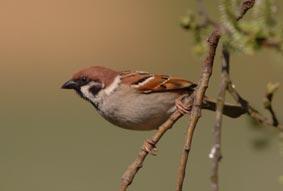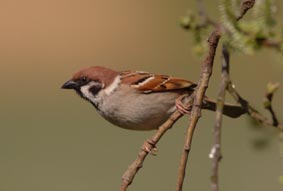Birds: Tree Sparrow (Gealbhan crainnr, Passer montanus)

The Tree Sparrow is Ireland's "other" sparrow species. Closely related to the well-known House Sparrow, it is much less familiar, being confined mainly to agricultural areas with a combination of dense hedgerows and cereal crops. This means that its range in Ireland is becoming ever more fragmented and it is now more or less restricted to the eastern and northern coastal regions.
An attractive little bird, at 14cm in length, a noteworthy feature of this species is that both sexes appear identical: this is very unusual for a sparrow species. Like the House Sparrow, it has a black-streaked brown back and wings, thin white wingbars, a black bill and a plain breast and belly, but differs completely in its head pattern: the crown is entirely chestnut, lacking any grey, with a large black spot at the rear of each cheek. Young birds look duller and often show a touch of yellow at each side of the bill.
Tree Sparrows rely on seeds, both wild and cultivated, for their survival, though they also eat small invertebrates such as aphids and caterpillars, protein-rich creatures which are particularly vital for growing chicks. They remain with us year-round and tend to gather into flocks in the winter, often with House Sparrows and other seed-eating birds.
As ever more arable land is turned over to development and hedgerows are ripped out, and as cereal crops make way for silage, so the Tree Sparrow is really feeling the pinch. It is not alone in this: other once iconic farmland birds have also declined drastically in recent years, such as the Yellowhammer and the Corncrake. Some success has been achieved in recent years in the provision of special Tree Sparrow nestboxes but more needs to be done if we are to prevent these wonderful species from being lost forever.
NIALL HATCH
More For more information on BirdWatch Ireland's farmland bird conservation projects, please contact BirdWatch Ireland's Midlands Office at Crank House, Banagher, Co. Offaly; you can also phone them at 05791-51676, e-mail info@birdwatchireland.ie or visit www.birdwatchireland.ie for more details.
